Global Events Industry: Analyzing Development, Impacts & Strategies
VerifiedAdded on 2023/06/13
|11
|3932
|279
Report
AI Summary
This report provides a comprehensive analysis of the global events industry, covering its diversity, the factors influencing its development on both local and global levels, and the structure and organization of the industry within society. It evaluates factors that shape the industry, including cultural, tourism, and economic aspects. The report also examines the value, impacts, and legacy of global events, along with management strategies for responsible event development, assessing their impact on the environment. It concludes by highlighting the significance of global events in fostering cultural exchange, economic growth, and international relations, emphasizing the role of effective management in mitigating environmental impacts and ensuring sustainable development within the industry. Desklib offers similar solved assignments for students.

Global Events
1
1
Paraphrase This Document
Need a fresh take? Get an instant paraphrase of this document with our AI Paraphraser
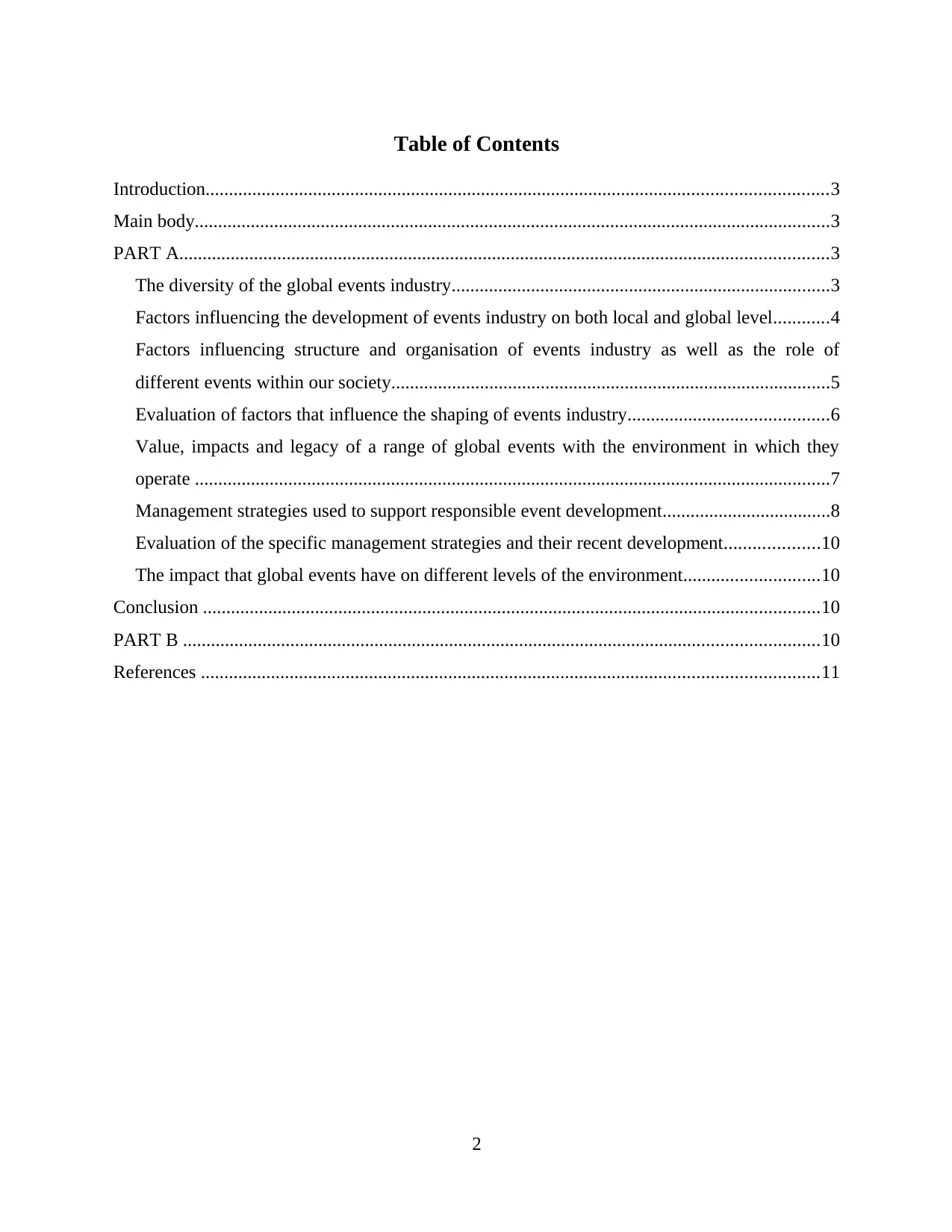
Table of Contents
Introduction.....................................................................................................................................3
Main body........................................................................................................................................3
PART A...........................................................................................................................................3
The diversity of the global events industry.................................................................................3
Factors influencing the development of events industry on both local and global level............4
Factors influencing structure and organisation of events industry as well as the role of
different events within our society..............................................................................................5
Evaluation of factors that influence the shaping of events industry...........................................6
Value, impacts and legacy of a range of global events with the environment in which they
operate ........................................................................................................................................7
Management strategies used to support responsible event development....................................8
Evaluation of the specific management strategies and their recent development....................10
The impact that global events have on different levels of the environment.............................10
Conclusion ....................................................................................................................................10
PART B ........................................................................................................................................10
References ....................................................................................................................................11
2
Introduction.....................................................................................................................................3
Main body........................................................................................................................................3
PART A...........................................................................................................................................3
The diversity of the global events industry.................................................................................3
Factors influencing the development of events industry on both local and global level............4
Factors influencing structure and organisation of events industry as well as the role of
different events within our society..............................................................................................5
Evaluation of factors that influence the shaping of events industry...........................................6
Value, impacts and legacy of a range of global events with the environment in which they
operate ........................................................................................................................................7
Management strategies used to support responsible event development....................................8
Evaluation of the specific management strategies and their recent development....................10
The impact that global events have on different levels of the environment.............................10
Conclusion ....................................................................................................................................10
PART B ........................................................................................................................................10
References ....................................................................................................................................11
2
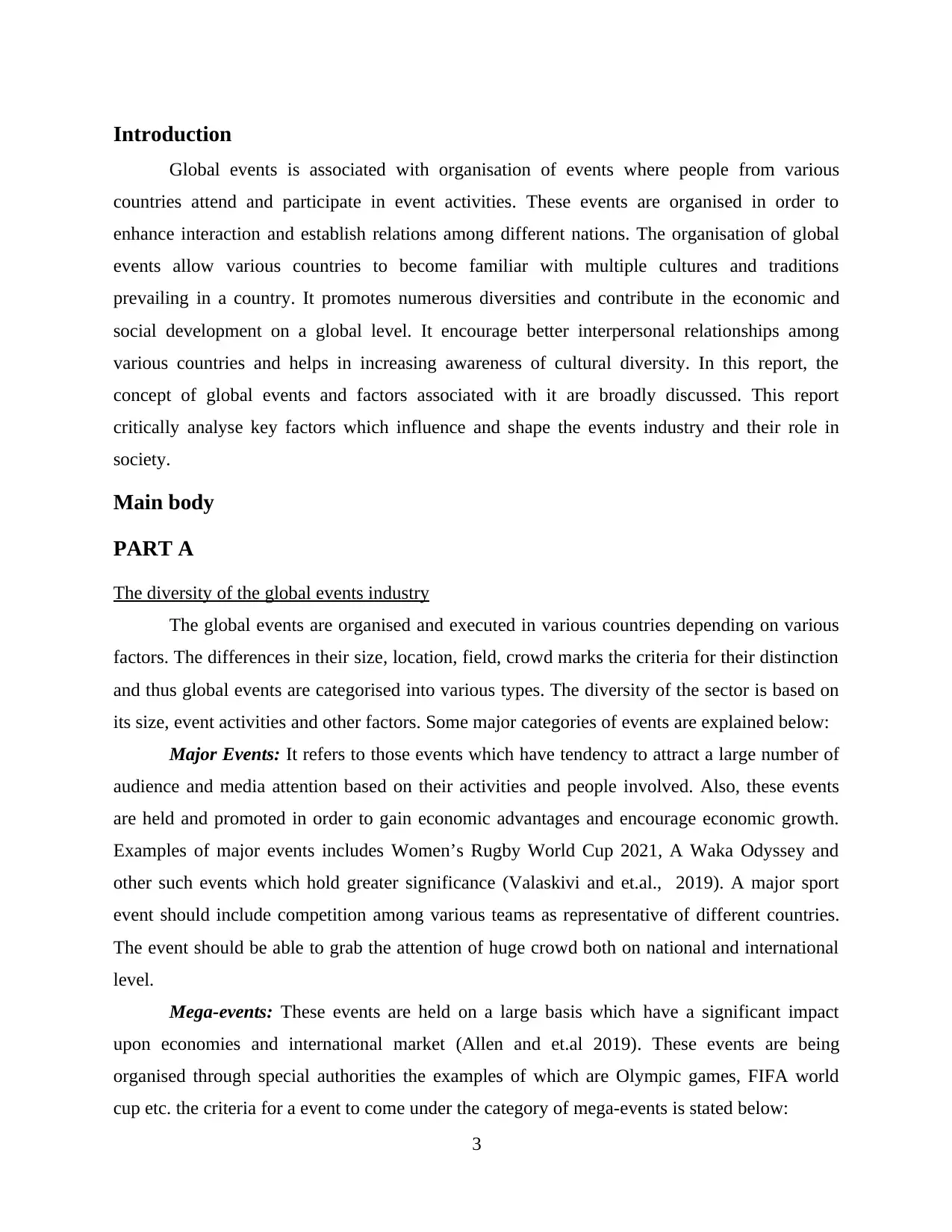
Introduction
Global events is associated with organisation of events where people from various
countries attend and participate in event activities. These events are organised in order to
enhance interaction and establish relations among different nations. The organisation of global
events allow various countries to become familiar with multiple cultures and traditions
prevailing in a country. It promotes numerous diversities and contribute in the economic and
social development on a global level. It encourage better interpersonal relationships among
various countries and helps in increasing awareness of cultural diversity. In this report, the
concept of global events and factors associated with it are broadly discussed. This report
critically analyse key factors which influence and shape the events industry and their role in
society.
Main body
PART A
The diversity of the global events industry
The global events are organised and executed in various countries depending on various
factors. The differences in their size, location, field, crowd marks the criteria for their distinction
and thus global events are categorised into various types. The diversity of the sector is based on
its size, event activities and other factors. Some major categories of events are explained below:
Major Events: It refers to those events which have tendency to attract a large number of
audience and media attention based on their activities and people involved. Also, these events
are held and promoted in order to gain economic advantages and encourage economic growth.
Examples of major events includes Women’s Rugby World Cup 2021, A Waka Odyssey and
other such events which hold greater significance (Valaskivi and et.al., 2019). A major sport
event should include competition among various teams as representative of different countries.
The event should be able to grab the attention of huge crowd both on national and international
level.
Mega-events: These events are held on a large basis which have a significant impact
upon economies and international market (Allen and et.al 2019). These events are being
organised through special authorities the examples of which are Olympic games, FIFA world
cup etc. the criteria for a event to come under the category of mega-events is stated below:
3
Global events is associated with organisation of events where people from various
countries attend and participate in event activities. These events are organised in order to
enhance interaction and establish relations among different nations. The organisation of global
events allow various countries to become familiar with multiple cultures and traditions
prevailing in a country. It promotes numerous diversities and contribute in the economic and
social development on a global level. It encourage better interpersonal relationships among
various countries and helps in increasing awareness of cultural diversity. In this report, the
concept of global events and factors associated with it are broadly discussed. This report
critically analyse key factors which influence and shape the events industry and their role in
society.
Main body
PART A
The diversity of the global events industry
The global events are organised and executed in various countries depending on various
factors. The differences in their size, location, field, crowd marks the criteria for their distinction
and thus global events are categorised into various types. The diversity of the sector is based on
its size, event activities and other factors. Some major categories of events are explained below:
Major Events: It refers to those events which have tendency to attract a large number of
audience and media attention based on their activities and people involved. Also, these events
are held and promoted in order to gain economic advantages and encourage economic growth.
Examples of major events includes Women’s Rugby World Cup 2021, A Waka Odyssey and
other such events which hold greater significance (Valaskivi and et.al., 2019). A major sport
event should include competition among various teams as representative of different countries.
The event should be able to grab the attention of huge crowd both on national and international
level.
Mega-events: These events are held on a large basis which have a significant impact
upon economies and international market (Allen and et.al 2019). These events are being
organised through special authorities the examples of which are Olympic games, FIFA world
cup etc. the criteria for a event to come under the category of mega-events is stated below:
3
⊘ This is a preview!⊘
Do you want full access?
Subscribe today to unlock all pages.

Trusted by 1+ million students worldwide
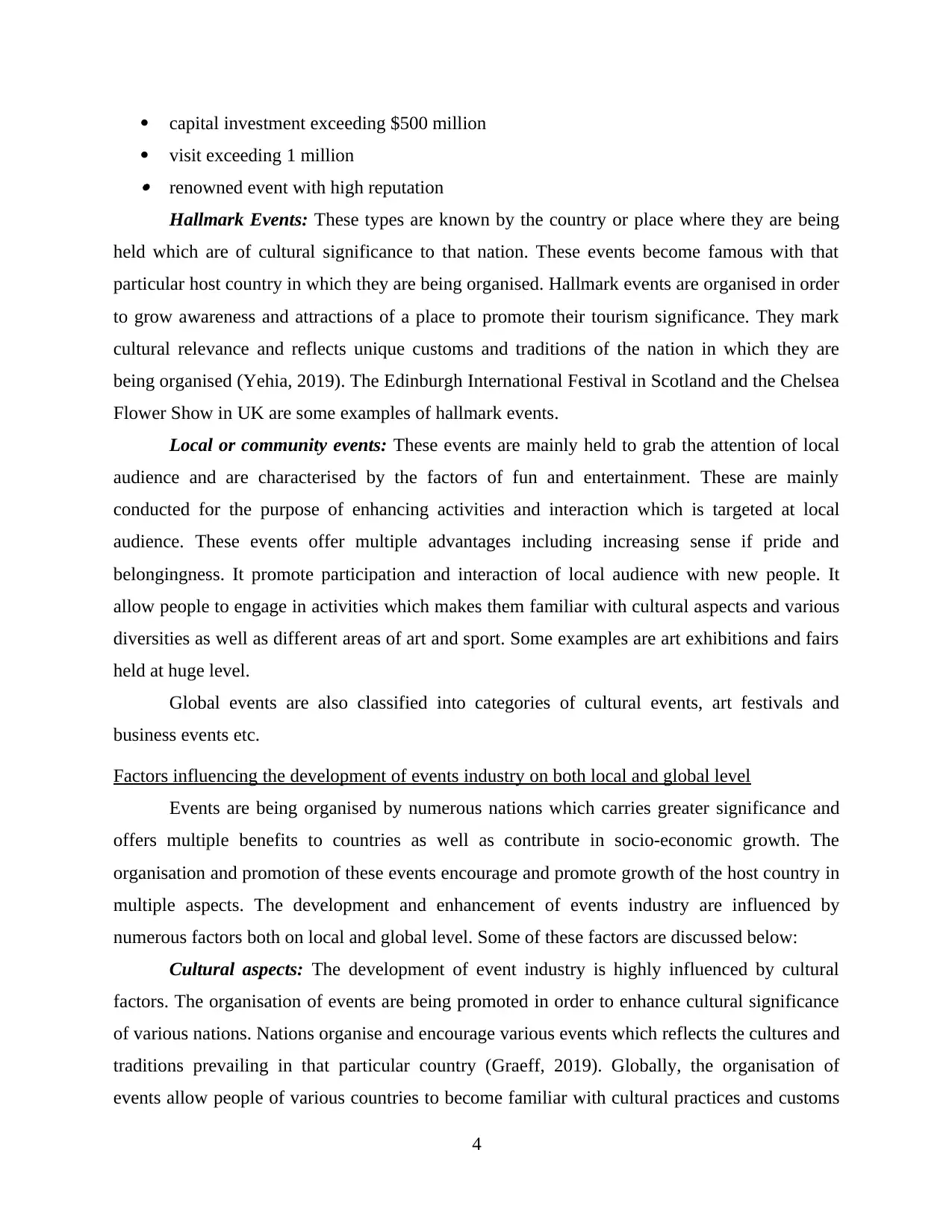
capital investment exceeding $500 million
visit exceeding 1 million renowned event with high reputation
Hallmark Events: These types are known by the country or place where they are being
held which are of cultural significance to that nation. These events become famous with that
particular host country in which they are being organised. Hallmark events are organised in order
to grow awareness and attractions of a place to promote their tourism significance. They mark
cultural relevance and reflects unique customs and traditions of the nation in which they are
being organised (Yehia, 2019). The Edinburgh International Festival in Scotland and the Chelsea
Flower Show in UK are some examples of hallmark events.
Local or community events: These events are mainly held to grab the attention of local
audience and are characterised by the factors of fun and entertainment. These are mainly
conducted for the purpose of enhancing activities and interaction which is targeted at local
audience. These events offer multiple advantages including increasing sense if pride and
belongingness. It promote participation and interaction of local audience with new people. It
allow people to engage in activities which makes them familiar with cultural aspects and various
diversities as well as different areas of art and sport. Some examples are art exhibitions and fairs
held at huge level.
Global events are also classified into categories of cultural events, art festivals and
business events etc.
Factors influencing the development of events industry on both local and global level
Events are being organised by numerous nations which carries greater significance and
offers multiple benefits to countries as well as contribute in socio-economic growth. The
organisation and promotion of these events encourage and promote growth of the host country in
multiple aspects. The development and enhancement of events industry are influenced by
numerous factors both on local and global level. Some of these factors are discussed below:
Cultural aspects: The development of event industry is highly influenced by cultural
factors. The organisation of events are being promoted in order to enhance cultural significance
of various nations. Nations organise and encourage various events which reflects the cultures and
traditions prevailing in that particular country (Graeff, 2019). Globally, the organisation of
events allow people of various countries to become familiar with cultural practices and customs
4
visit exceeding 1 million renowned event with high reputation
Hallmark Events: These types are known by the country or place where they are being
held which are of cultural significance to that nation. These events become famous with that
particular host country in which they are being organised. Hallmark events are organised in order
to grow awareness and attractions of a place to promote their tourism significance. They mark
cultural relevance and reflects unique customs and traditions of the nation in which they are
being organised (Yehia, 2019). The Edinburgh International Festival in Scotland and the Chelsea
Flower Show in UK are some examples of hallmark events.
Local or community events: These events are mainly held to grab the attention of local
audience and are characterised by the factors of fun and entertainment. These are mainly
conducted for the purpose of enhancing activities and interaction which is targeted at local
audience. These events offer multiple advantages including increasing sense if pride and
belongingness. It promote participation and interaction of local audience with new people. It
allow people to engage in activities which makes them familiar with cultural aspects and various
diversities as well as different areas of art and sport. Some examples are art exhibitions and fairs
held at huge level.
Global events are also classified into categories of cultural events, art festivals and
business events etc.
Factors influencing the development of events industry on both local and global level
Events are being organised by numerous nations which carries greater significance and
offers multiple benefits to countries as well as contribute in socio-economic growth. The
organisation and promotion of these events encourage and promote growth of the host country in
multiple aspects. The development and enhancement of events industry are influenced by
numerous factors both on local and global level. Some of these factors are discussed below:
Cultural aspects: The development of event industry is highly influenced by cultural
factors. The organisation of events are being promoted in order to enhance cultural significance
of various nations. Nations organise and encourage various events which reflects the cultures and
traditions prevailing in that particular country (Graeff, 2019). Globally, the organisation of
events allow people of various countries to become familiar with cultural practices and customs
4
Paraphrase This Document
Need a fresh take? Get an instant paraphrase of this document with our AI Paraphraser
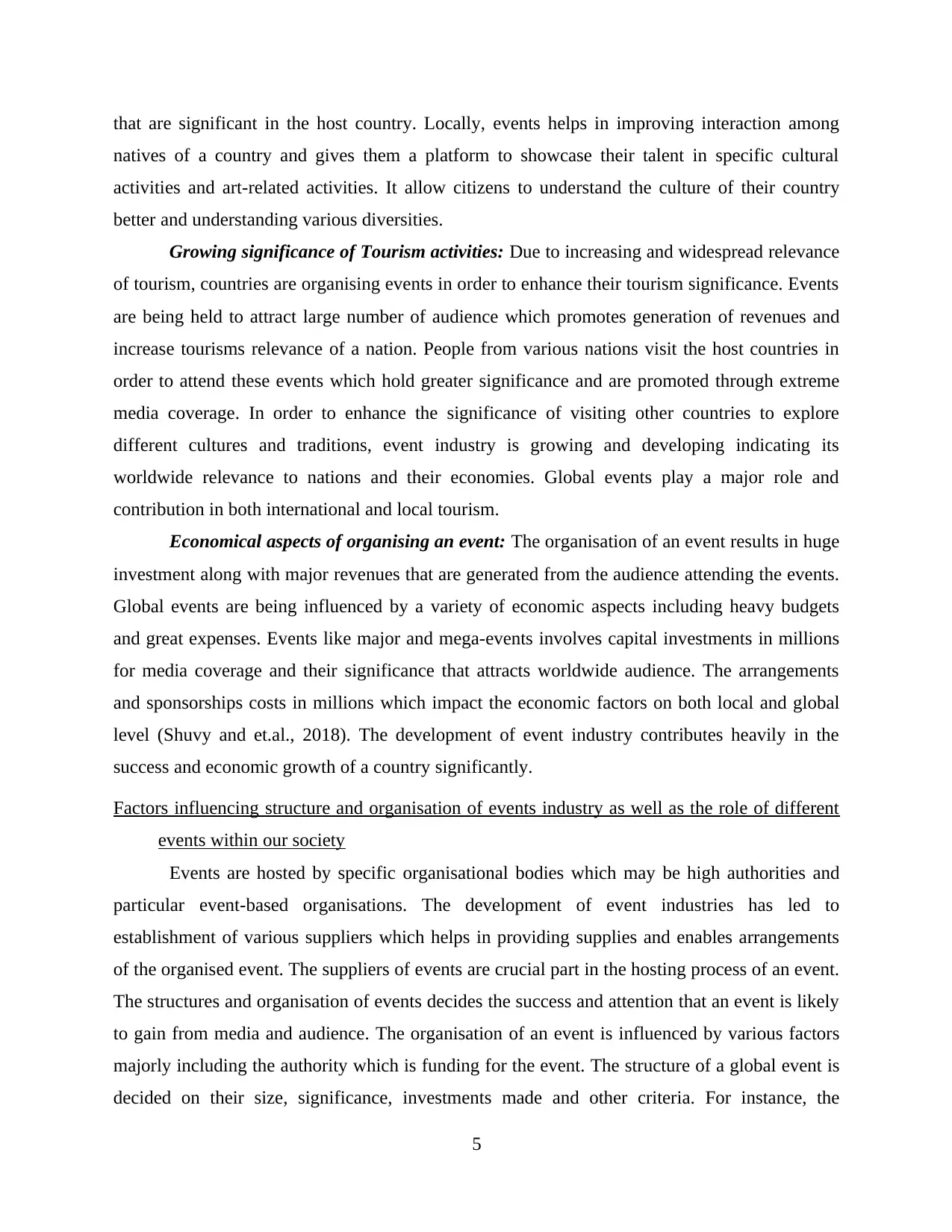
that are significant in the host country. Locally, events helps in improving interaction among
natives of a country and gives them a platform to showcase their talent in specific cultural
activities and art-related activities. It allow citizens to understand the culture of their country
better and understanding various diversities.
Growing significance of Tourism activities: Due to increasing and widespread relevance
of tourism, countries are organising events in order to enhance their tourism significance. Events
are being held to attract large number of audience which promotes generation of revenues and
increase tourisms relevance of a nation. People from various nations visit the host countries in
order to attend these events which hold greater significance and are promoted through extreme
media coverage. In order to enhance the significance of visiting other countries to explore
different cultures and traditions, event industry is growing and developing indicating its
worldwide relevance to nations and their economies. Global events play a major role and
contribution in both international and local tourism.
Economical aspects of organising an event: The organisation of an event results in huge
investment along with major revenues that are generated from the audience attending the events.
Global events are being influenced by a variety of economic aspects including heavy budgets
and great expenses. Events like major and mega-events involves capital investments in millions
for media coverage and their significance that attracts worldwide audience. The arrangements
and sponsorships costs in millions which impact the economic factors on both local and global
level (Shuvy and et.al., 2018). The development of event industry contributes heavily in the
success and economic growth of a country significantly.
Factors influencing structure and organisation of events industry as well as the role of different
events within our society
Events are hosted by specific organisational bodies which may be high authorities and
particular event-based organisations. The development of event industries has led to
establishment of various suppliers which helps in providing supplies and enables arrangements
of the organised event. The suppliers of events are crucial part in the hosting process of an event.
The structures and organisation of events decides the success and attention that an event is likely
to gain from media and audience. The organisation of an event is influenced by various factors
majorly including the authority which is funding for the event. The structure of a global event is
decided on their size, significance, investments made and other criteria. For instance, the
5
natives of a country and gives them a platform to showcase their talent in specific cultural
activities and art-related activities. It allow citizens to understand the culture of their country
better and understanding various diversities.
Growing significance of Tourism activities: Due to increasing and widespread relevance
of tourism, countries are organising events in order to enhance their tourism significance. Events
are being held to attract large number of audience which promotes generation of revenues and
increase tourisms relevance of a nation. People from various nations visit the host countries in
order to attend these events which hold greater significance and are promoted through extreme
media coverage. In order to enhance the significance of visiting other countries to explore
different cultures and traditions, event industry is growing and developing indicating its
worldwide relevance to nations and their economies. Global events play a major role and
contribution in both international and local tourism.
Economical aspects of organising an event: The organisation of an event results in huge
investment along with major revenues that are generated from the audience attending the events.
Global events are being influenced by a variety of economic aspects including heavy budgets
and great expenses. Events like major and mega-events involves capital investments in millions
for media coverage and their significance that attracts worldwide audience. The arrangements
and sponsorships costs in millions which impact the economic factors on both local and global
level (Shuvy and et.al., 2018). The development of event industry contributes heavily in the
success and economic growth of a country significantly.
Factors influencing structure and organisation of events industry as well as the role of different
events within our society
Events are hosted by specific organisational bodies which may be high authorities and
particular event-based organisations. The development of event industries has led to
establishment of various suppliers which helps in providing supplies and enables arrangements
of the organised event. The suppliers of events are crucial part in the hosting process of an event.
The structures and organisation of events decides the success and attention that an event is likely
to gain from media and audience. The organisation of an event is influenced by various factors
majorly including the authority which is funding for the event. The structure of a global event is
decided on their size, significance, investments made and other criteria. For instance, the
5
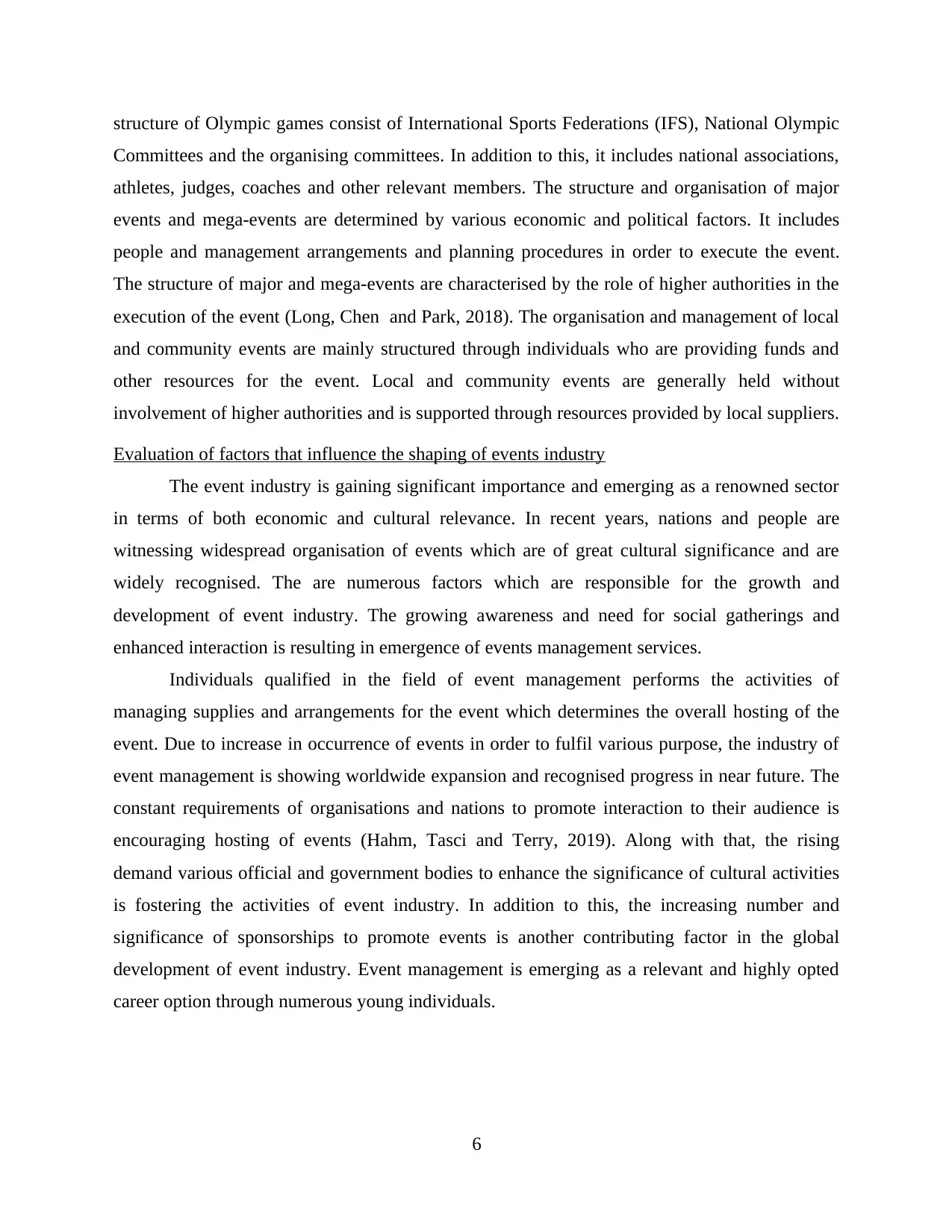
structure of Olympic games consist of International Sports Federations (IFS), National Olympic
Committees and the organising committees. In addition to this, it includes national associations,
athletes, judges, coaches and other relevant members. The structure and organisation of major
events and mega-events are determined by various economic and political factors. It includes
people and management arrangements and planning procedures in order to execute the event.
The structure of major and mega-events are characterised by the role of higher authorities in the
execution of the event (Long, Chen and Park, 2018). The organisation and management of local
and community events are mainly structured through individuals who are providing funds and
other resources for the event. Local and community events are generally held without
involvement of higher authorities and is supported through resources provided by local suppliers.
Evaluation of factors that influence the shaping of events industry
The event industry is gaining significant importance and emerging as a renowned sector
in terms of both economic and cultural relevance. In recent years, nations and people are
witnessing widespread organisation of events which are of great cultural significance and are
widely recognised. The are numerous factors which are responsible for the growth and
development of event industry. The growing awareness and need for social gatherings and
enhanced interaction is resulting in emergence of events management services.
Individuals qualified in the field of event management performs the activities of
managing supplies and arrangements for the event which determines the overall hosting of the
event. Due to increase in occurrence of events in order to fulfil various purpose, the industry of
event management is showing worldwide expansion and recognised progress in near future. The
constant requirements of organisations and nations to promote interaction to their audience is
encouraging hosting of events (Hahm, Tasci and Terry, 2019). Along with that, the rising
demand various official and government bodies to enhance the significance of cultural activities
is fostering the activities of event industry. In addition to this, the increasing number and
significance of sponsorships to promote events is another contributing factor in the global
development of event industry. Event management is emerging as a relevant and highly opted
career option through numerous young individuals.
6
Committees and the organising committees. In addition to this, it includes national associations,
athletes, judges, coaches and other relevant members. The structure and organisation of major
events and mega-events are determined by various economic and political factors. It includes
people and management arrangements and planning procedures in order to execute the event.
The structure of major and mega-events are characterised by the role of higher authorities in the
execution of the event (Long, Chen and Park, 2018). The organisation and management of local
and community events are mainly structured through individuals who are providing funds and
other resources for the event. Local and community events are generally held without
involvement of higher authorities and is supported through resources provided by local suppliers.
Evaluation of factors that influence the shaping of events industry
The event industry is gaining significant importance and emerging as a renowned sector
in terms of both economic and cultural relevance. In recent years, nations and people are
witnessing widespread organisation of events which are of great cultural significance and are
widely recognised. The are numerous factors which are responsible for the growth and
development of event industry. The growing awareness and need for social gatherings and
enhanced interaction is resulting in emergence of events management services.
Individuals qualified in the field of event management performs the activities of
managing supplies and arrangements for the event which determines the overall hosting of the
event. Due to increase in occurrence of events in order to fulfil various purpose, the industry of
event management is showing worldwide expansion and recognised progress in near future. The
constant requirements of organisations and nations to promote interaction to their audience is
encouraging hosting of events (Hahm, Tasci and Terry, 2019). Along with that, the rising
demand various official and government bodies to enhance the significance of cultural activities
is fostering the activities of event industry. In addition to this, the increasing number and
significance of sponsorships to promote events is another contributing factor in the global
development of event industry. Event management is emerging as a relevant and highly opted
career option through numerous young individuals.
6
⊘ This is a preview!⊘
Do you want full access?
Subscribe today to unlock all pages.

Trusted by 1+ million students worldwide
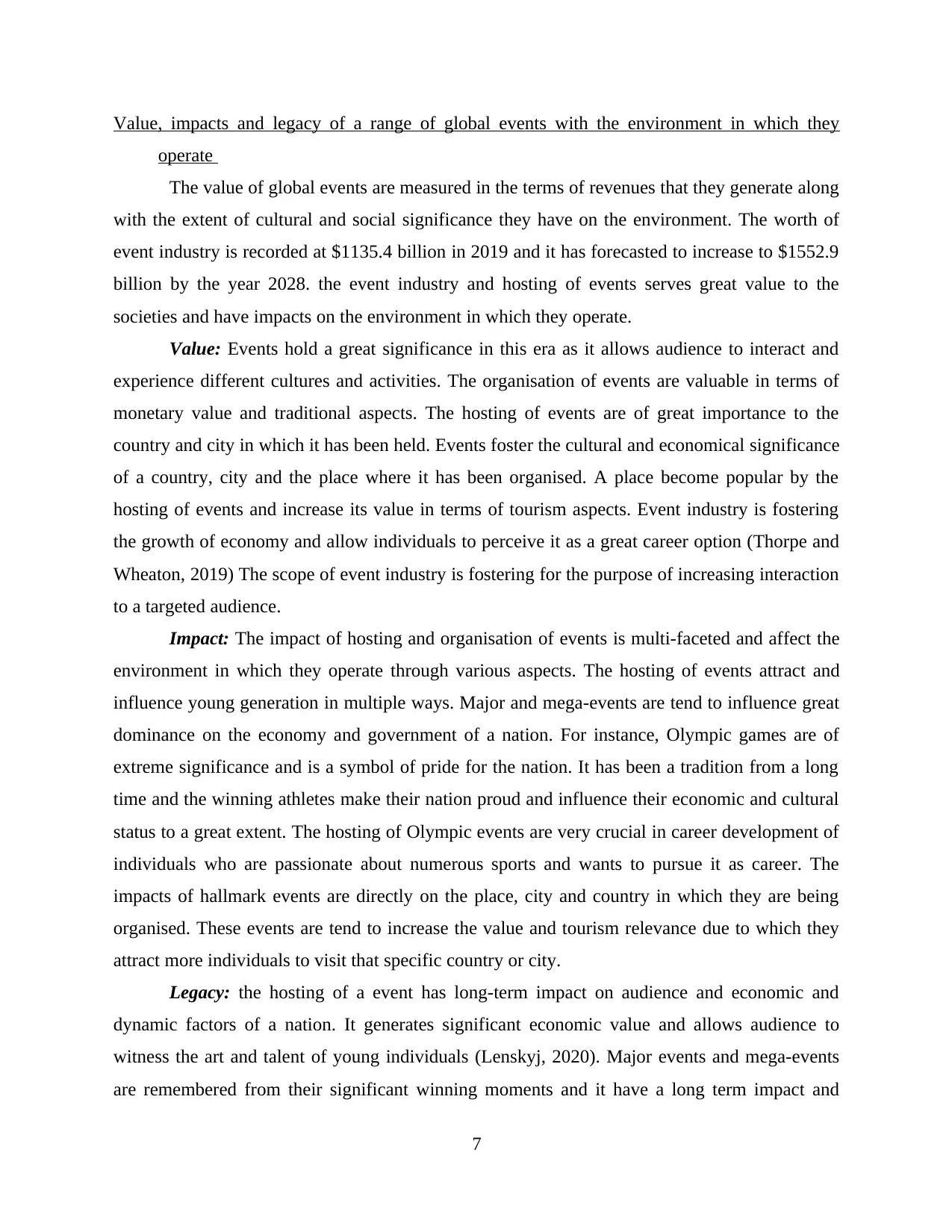
Value, impacts and legacy of a range of global events with the environment in which they
operate
The value of global events are measured in the terms of revenues that they generate along
with the extent of cultural and social significance they have on the environment. The worth of
event industry is recorded at $1135.4 billion in 2019 and it has forecasted to increase to $1552.9
billion by the year 2028. the event industry and hosting of events serves great value to the
societies and have impacts on the environment in which they operate.
Value: Events hold a great significance in this era as it allows audience to interact and
experience different cultures and activities. The organisation of events are valuable in terms of
monetary value and traditional aspects. The hosting of events are of great importance to the
country and city in which it has been held. Events foster the cultural and economical significance
of a country, city and the place where it has been organised. A place become popular by the
hosting of events and increase its value in terms of tourism aspects. Event industry is fostering
the growth of economy and allow individuals to perceive it as a great career option (Thorpe and
Wheaton, 2019) The scope of event industry is fostering for the purpose of increasing interaction
to a targeted audience.
Impact: The impact of hosting and organisation of events is multi-faceted and affect the
environment in which they operate through various aspects. The hosting of events attract and
influence young generation in multiple ways. Major and mega-events are tend to influence great
dominance on the economy and government of a nation. For instance, Olympic games are of
extreme significance and is a symbol of pride for the nation. It has been a tradition from a long
time and the winning athletes make their nation proud and influence their economic and cultural
status to a great extent. The hosting of Olympic events are very crucial in career development of
individuals who are passionate about numerous sports and wants to pursue it as career. The
impacts of hallmark events are directly on the place, city and country in which they are being
organised. These events are tend to increase the value and tourism relevance due to which they
attract more individuals to visit that specific country or city.
Legacy: the hosting of a event has long-term impact on audience and economic and
dynamic factors of a nation. It generates significant economic value and allows audience to
witness the art and talent of young individuals (Lenskyj, 2020). Major events and mega-events
are remembered from their significant winning moments and it have a long term impact and
7
operate
The value of global events are measured in the terms of revenues that they generate along
with the extent of cultural and social significance they have on the environment. The worth of
event industry is recorded at $1135.4 billion in 2019 and it has forecasted to increase to $1552.9
billion by the year 2028. the event industry and hosting of events serves great value to the
societies and have impacts on the environment in which they operate.
Value: Events hold a great significance in this era as it allows audience to interact and
experience different cultures and activities. The organisation of events are valuable in terms of
monetary value and traditional aspects. The hosting of events are of great importance to the
country and city in which it has been held. Events foster the cultural and economical significance
of a country, city and the place where it has been organised. A place become popular by the
hosting of events and increase its value in terms of tourism aspects. Event industry is fostering
the growth of economy and allow individuals to perceive it as a great career option (Thorpe and
Wheaton, 2019) The scope of event industry is fostering for the purpose of increasing interaction
to a targeted audience.
Impact: The impact of hosting and organisation of events is multi-faceted and affect the
environment in which they operate through various aspects. The hosting of events attract and
influence young generation in multiple ways. Major and mega-events are tend to influence great
dominance on the economy and government of a nation. For instance, Olympic games are of
extreme significance and is a symbol of pride for the nation. It has been a tradition from a long
time and the winning athletes make their nation proud and influence their economic and cultural
status to a great extent. The hosting of Olympic events are very crucial in career development of
individuals who are passionate about numerous sports and wants to pursue it as career. The
impacts of hallmark events are directly on the place, city and country in which they are being
organised. These events are tend to increase the value and tourism relevance due to which they
attract more individuals to visit that specific country or city.
Legacy: the hosting of a event has long-term impact on audience and economic and
dynamic factors of a nation. It generates significant economic value and allows audience to
witness the art and talent of young individuals (Lenskyj, 2020). Major events and mega-events
are remembered from their significant winning moments and it have a long term impact and
7
Paraphrase This Document
Need a fresh take? Get an instant paraphrase of this document with our AI Paraphraser
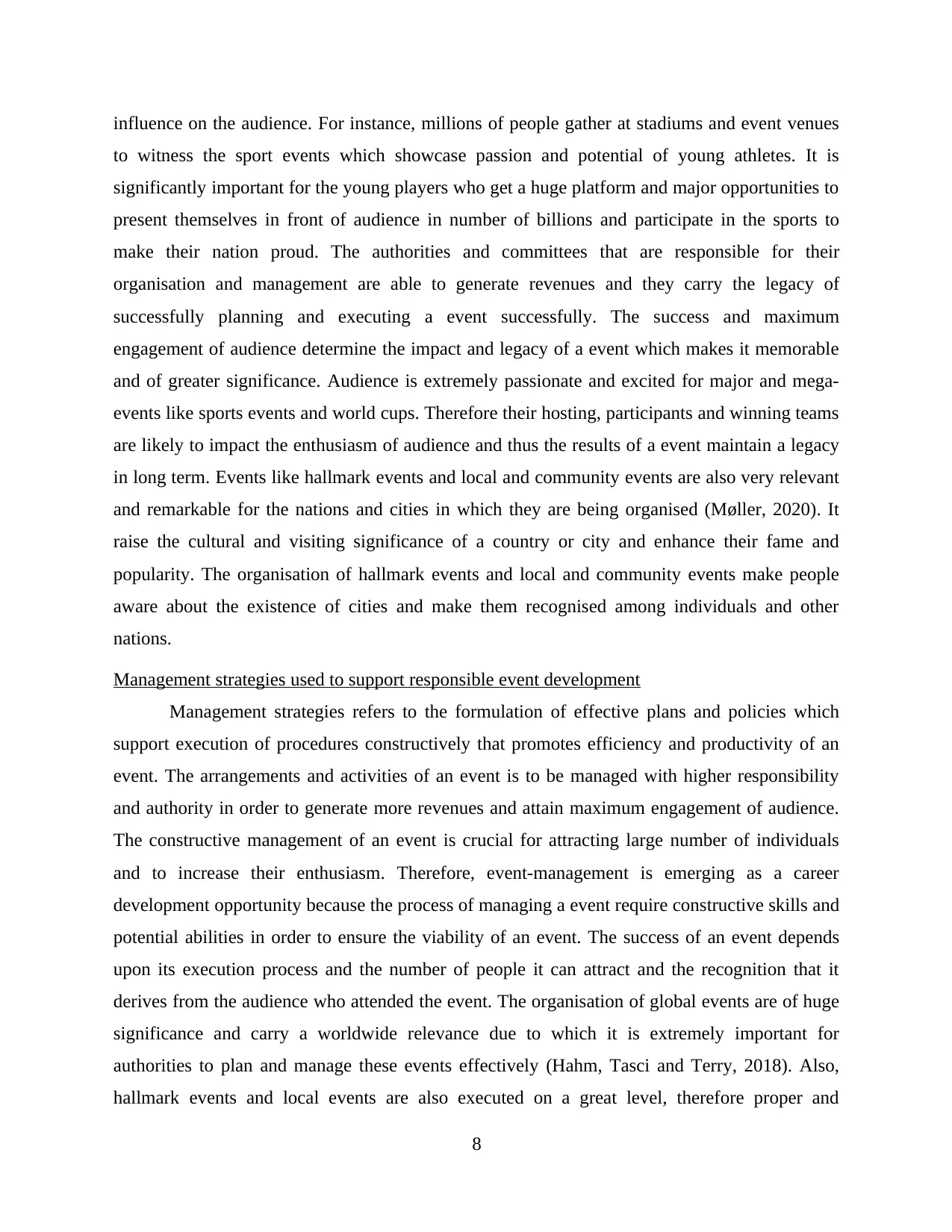
influence on the audience. For instance, millions of people gather at stadiums and event venues
to witness the sport events which showcase passion and potential of young athletes. It is
significantly important for the young players who get a huge platform and major opportunities to
present themselves in front of audience in number of billions and participate in the sports to
make their nation proud. The authorities and committees that are responsible for their
organisation and management are able to generate revenues and they carry the legacy of
successfully planning and executing a event successfully. The success and maximum
engagement of audience determine the impact and legacy of a event which makes it memorable
and of greater significance. Audience is extremely passionate and excited for major and mega-
events like sports events and world cups. Therefore their hosting, participants and winning teams
are likely to impact the enthusiasm of audience and thus the results of a event maintain a legacy
in long term. Events like hallmark events and local and community events are also very relevant
and remarkable for the nations and cities in which they are being organised (Møller, 2020). It
raise the cultural and visiting significance of a country or city and enhance their fame and
popularity. The organisation of hallmark events and local and community events make people
aware about the existence of cities and make them recognised among individuals and other
nations.
Management strategies used to support responsible event development
Management strategies refers to the formulation of effective plans and policies which
support execution of procedures constructively that promotes efficiency and productivity of an
event. The arrangements and activities of an event is to be managed with higher responsibility
and authority in order to generate more revenues and attain maximum engagement of audience.
The constructive management of an event is crucial for attracting large number of individuals
and to increase their enthusiasm. Therefore, event-management is emerging as a career
development opportunity because the process of managing a event require constructive skills and
potential abilities in order to ensure the viability of an event. The success of an event depends
upon its execution process and the number of people it can attract and the recognition that it
derives from the audience who attended the event. The organisation of global events are of huge
significance and carry a worldwide relevance due to which it is extremely important for
authorities to plan and manage these events effectively (Hahm, Tasci and Terry, 2018). Also,
hallmark events and local events are also executed on a great level, therefore proper and
8
to witness the sport events which showcase passion and potential of young athletes. It is
significantly important for the young players who get a huge platform and major opportunities to
present themselves in front of audience in number of billions and participate in the sports to
make their nation proud. The authorities and committees that are responsible for their
organisation and management are able to generate revenues and they carry the legacy of
successfully planning and executing a event successfully. The success and maximum
engagement of audience determine the impact and legacy of a event which makes it memorable
and of greater significance. Audience is extremely passionate and excited for major and mega-
events like sports events and world cups. Therefore their hosting, participants and winning teams
are likely to impact the enthusiasm of audience and thus the results of a event maintain a legacy
in long term. Events like hallmark events and local and community events are also very relevant
and remarkable for the nations and cities in which they are being organised (Møller, 2020). It
raise the cultural and visiting significance of a country or city and enhance their fame and
popularity. The organisation of hallmark events and local and community events make people
aware about the existence of cities and make them recognised among individuals and other
nations.
Management strategies used to support responsible event development
Management strategies refers to the formulation of effective plans and policies which
support execution of procedures constructively that promotes efficiency and productivity of an
event. The arrangements and activities of an event is to be managed with higher responsibility
and authority in order to generate more revenues and attain maximum engagement of audience.
The constructive management of an event is crucial for attracting large number of individuals
and to increase their enthusiasm. Therefore, event-management is emerging as a career
development opportunity because the process of managing a event require constructive skills and
potential abilities in order to ensure the viability of an event. The success of an event depends
upon its execution process and the number of people it can attract and the recognition that it
derives from the audience who attended the event. The organisation of global events are of huge
significance and carry a worldwide relevance due to which it is extremely important for
authorities to plan and manage these events effectively (Hahm, Tasci and Terry, 2018). Also,
hallmark events and local events are also executed on a great level, therefore proper and
8
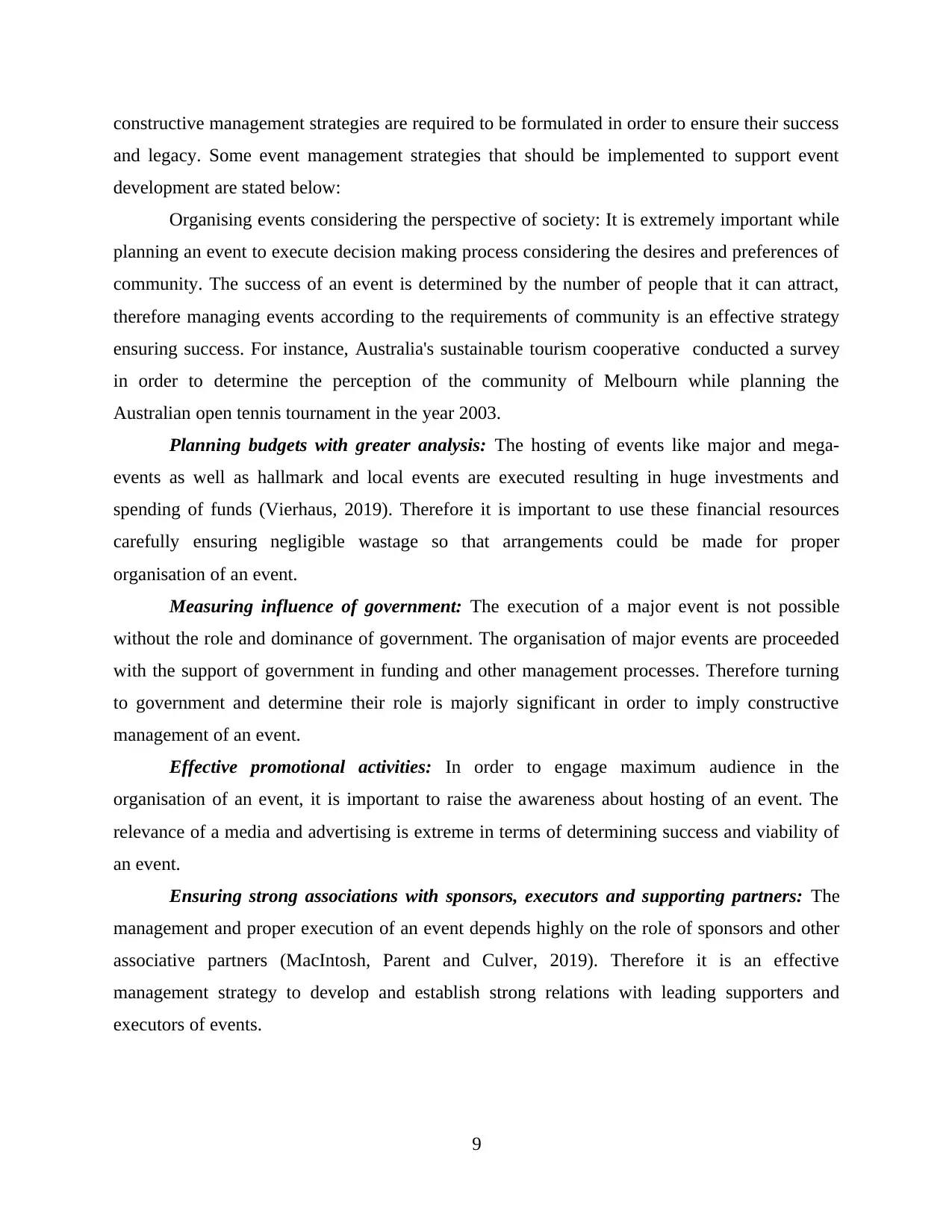
constructive management strategies are required to be formulated in order to ensure their success
and legacy. Some event management strategies that should be implemented to support event
development are stated below:
Organising events considering the perspective of society: It is extremely important while
planning an event to execute decision making process considering the desires and preferences of
community. The success of an event is determined by the number of people that it can attract,
therefore managing events according to the requirements of community is an effective strategy
ensuring success. For instance, Australia's sustainable tourism cooperative conducted a survey
in order to determine the perception of the community of Melbourn while planning the
Australian open tennis tournament in the year 2003.
Planning budgets with greater analysis: The hosting of events like major and mega-
events as well as hallmark and local events are executed resulting in huge investments and
spending of funds (Vierhaus, 2019). Therefore it is important to use these financial resources
carefully ensuring negligible wastage so that arrangements could be made for proper
organisation of an event.
Measuring influence of government: The execution of a major event is not possible
without the role and dominance of government. The organisation of major events are proceeded
with the support of government in funding and other management processes. Therefore turning
to government and determine their role is majorly significant in order to imply constructive
management of an event.
Effective promotional activities: In order to engage maximum audience in the
organisation of an event, it is important to raise the awareness about hosting of an event. The
relevance of a media and advertising is extreme in terms of determining success and viability of
an event.
Ensuring strong associations with sponsors, executors and supporting partners: The
management and proper execution of an event depends highly on the role of sponsors and other
associative partners (MacIntosh, Parent and Culver, 2019). Therefore it is an effective
management strategy to develop and establish strong relations with leading supporters and
executors of events.
9
and legacy. Some event management strategies that should be implemented to support event
development are stated below:
Organising events considering the perspective of society: It is extremely important while
planning an event to execute decision making process considering the desires and preferences of
community. The success of an event is determined by the number of people that it can attract,
therefore managing events according to the requirements of community is an effective strategy
ensuring success. For instance, Australia's sustainable tourism cooperative conducted a survey
in order to determine the perception of the community of Melbourn while planning the
Australian open tennis tournament in the year 2003.
Planning budgets with greater analysis: The hosting of events like major and mega-
events as well as hallmark and local events are executed resulting in huge investments and
spending of funds (Vierhaus, 2019). Therefore it is important to use these financial resources
carefully ensuring negligible wastage so that arrangements could be made for proper
organisation of an event.
Measuring influence of government: The execution of a major event is not possible
without the role and dominance of government. The organisation of major events are proceeded
with the support of government in funding and other management processes. Therefore turning
to government and determine their role is majorly significant in order to imply constructive
management of an event.
Effective promotional activities: In order to engage maximum audience in the
organisation of an event, it is important to raise the awareness about hosting of an event. The
relevance of a media and advertising is extreme in terms of determining success and viability of
an event.
Ensuring strong associations with sponsors, executors and supporting partners: The
management and proper execution of an event depends highly on the role of sponsors and other
associative partners (MacIntosh, Parent and Culver, 2019). Therefore it is an effective
management strategy to develop and establish strong relations with leading supporters and
executors of events.
9
⊘ This is a preview!⊘
Do you want full access?
Subscribe today to unlock all pages.

Trusted by 1+ million students worldwide
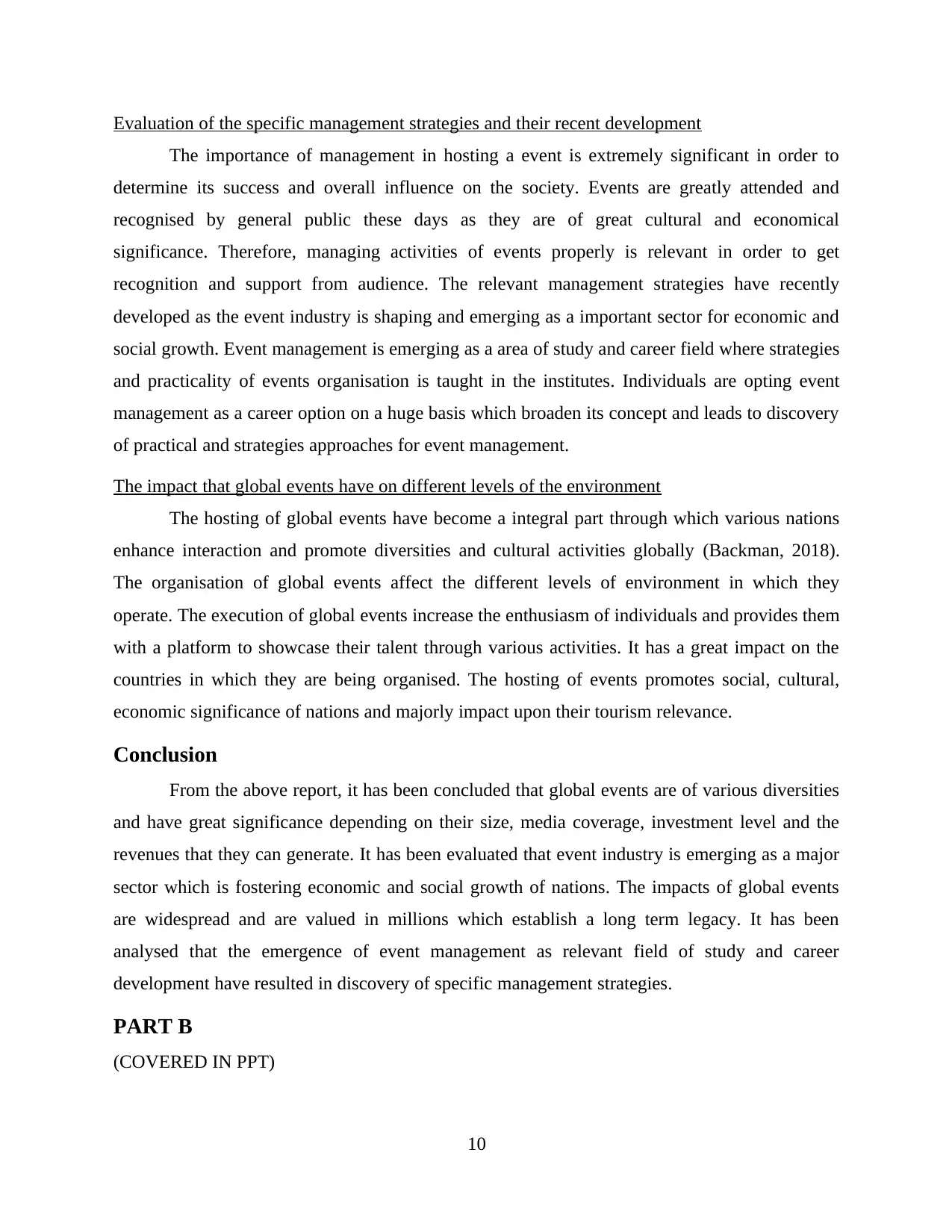
Evaluation of the specific management strategies and their recent development
The importance of management in hosting a event is extremely significant in order to
determine its success and overall influence on the society. Events are greatly attended and
recognised by general public these days as they are of great cultural and economical
significance. Therefore, managing activities of events properly is relevant in order to get
recognition and support from audience. The relevant management strategies have recently
developed as the event industry is shaping and emerging as a important sector for economic and
social growth. Event management is emerging as a area of study and career field where strategies
and practicality of events organisation is taught in the institutes. Individuals are opting event
management as a career option on a huge basis which broaden its concept and leads to discovery
of practical and strategies approaches for event management.
The impact that global events have on different levels of the environment
The hosting of global events have become a integral part through which various nations
enhance interaction and promote diversities and cultural activities globally (Backman, 2018).
The organisation of global events affect the different levels of environment in which they
operate. The execution of global events increase the enthusiasm of individuals and provides them
with a platform to showcase their talent through various activities. It has a great impact on the
countries in which they are being organised. The hosting of events promotes social, cultural,
economic significance of nations and majorly impact upon their tourism relevance.
Conclusion
From the above report, it has been concluded that global events are of various diversities
and have great significance depending on their size, media coverage, investment level and the
revenues that they can generate. It has been evaluated that event industry is emerging as a major
sector which is fostering economic and social growth of nations. The impacts of global events
are widespread and are valued in millions which establish a long term legacy. It has been
analysed that the emergence of event management as relevant field of study and career
development have resulted in discovery of specific management strategies.
PART B
(COVERED IN PPT)
10
The importance of management in hosting a event is extremely significant in order to
determine its success and overall influence on the society. Events are greatly attended and
recognised by general public these days as they are of great cultural and economical
significance. Therefore, managing activities of events properly is relevant in order to get
recognition and support from audience. The relevant management strategies have recently
developed as the event industry is shaping and emerging as a important sector for economic and
social growth. Event management is emerging as a area of study and career field where strategies
and practicality of events organisation is taught in the institutes. Individuals are opting event
management as a career option on a huge basis which broaden its concept and leads to discovery
of practical and strategies approaches for event management.
The impact that global events have on different levels of the environment
The hosting of global events have become a integral part through which various nations
enhance interaction and promote diversities and cultural activities globally (Backman, 2018).
The organisation of global events affect the different levels of environment in which they
operate. The execution of global events increase the enthusiasm of individuals and provides them
with a platform to showcase their talent through various activities. It has a great impact on the
countries in which they are being organised. The hosting of events promotes social, cultural,
economic significance of nations and majorly impact upon their tourism relevance.
Conclusion
From the above report, it has been concluded that global events are of various diversities
and have great significance depending on their size, media coverage, investment level and the
revenues that they can generate. It has been evaluated that event industry is emerging as a major
sector which is fostering economic and social growth of nations. The impacts of global events
are widespread and are valued in millions which establish a long term legacy. It has been
analysed that the emergence of event management as relevant field of study and career
development have resulted in discovery of specific management strategies.
PART B
(COVERED IN PPT)
10
Paraphrase This Document
Need a fresh take? Get an instant paraphrase of this document with our AI Paraphraser
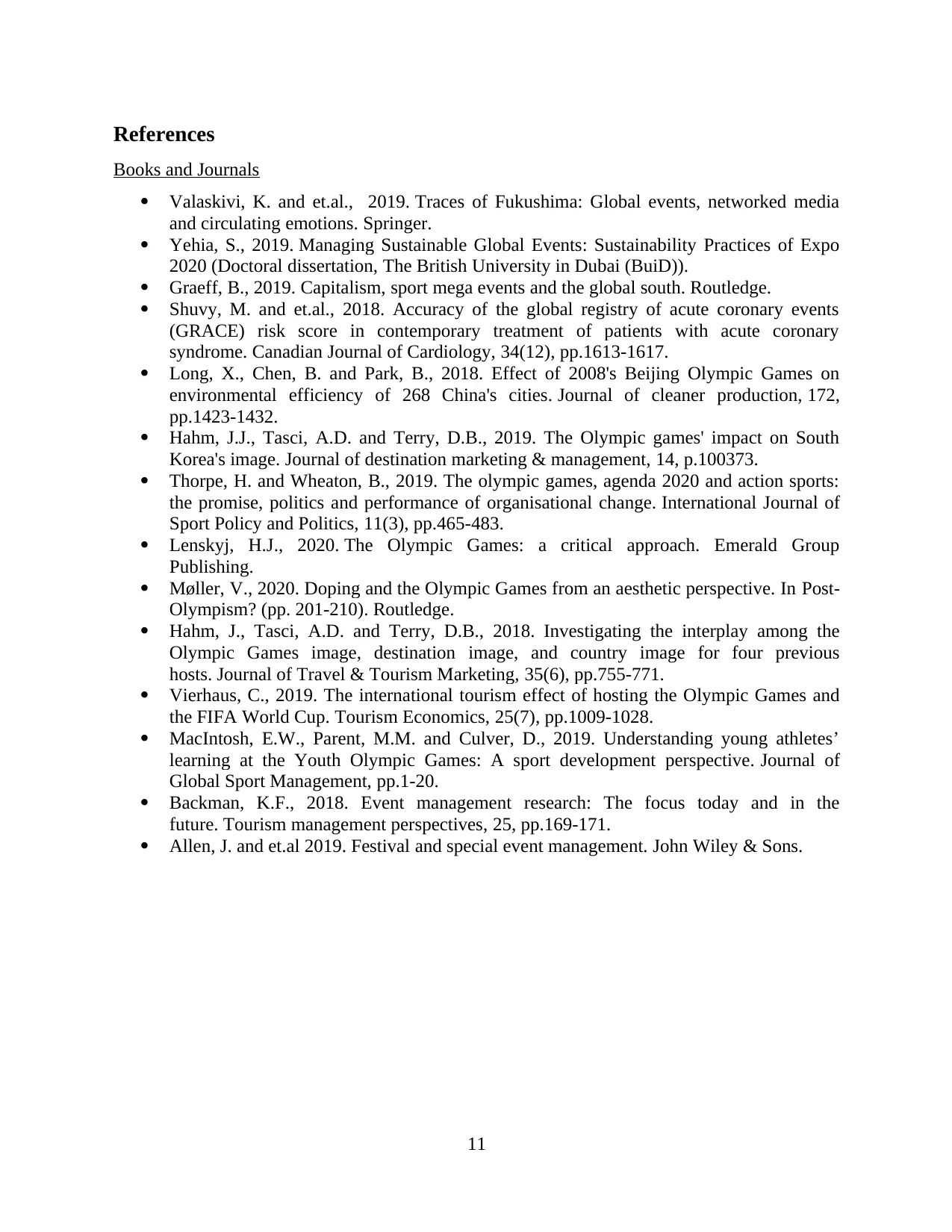
References
Books and Journals
Valaskivi, K. and et.al., 2019. Traces of Fukushima: Global events, networked media
and circulating emotions. Springer.
Yehia, S., 2019. Managing Sustainable Global Events: Sustainability Practices of Expo
2020 (Doctoral dissertation, The British University in Dubai (BuiD)).
Graeff, B., 2019. Capitalism, sport mega events and the global south. Routledge.
Shuvy, M. and et.al., 2018. Accuracy of the global registry of acute coronary events
(GRACE) risk score in contemporary treatment of patients with acute coronary
syndrome. Canadian Journal of Cardiology, 34(12), pp.1613-1617.
Long, X., Chen, B. and Park, B., 2018. Effect of 2008's Beijing Olympic Games on
environmental efficiency of 268 China's cities. Journal of cleaner production, 172,
pp.1423-1432.
Hahm, J.J., Tasci, A.D. and Terry, D.B., 2019. The Olympic games' impact on South
Korea's image. Journal of destination marketing & management, 14, p.100373.
Thorpe, H. and Wheaton, B., 2019. The olympic games, agenda 2020 and action sports:
the promise, politics and performance of organisational change. International Journal of
Sport Policy and Politics, 11(3), pp.465-483.
Lenskyj, H.J., 2020. The Olympic Games: a critical approach. Emerald Group
Publishing.
Møller, V., 2020. Doping and the Olympic Games from an aesthetic perspective. In Post-
Olympism? (pp. 201-210). Routledge.
Hahm, J., Tasci, A.D. and Terry, D.B., 2018. Investigating the interplay among the
Olympic Games image, destination image, and country image for four previous
hosts. Journal of Travel & Tourism Marketing, 35(6), pp.755-771.
Vierhaus, C., 2019. The international tourism effect of hosting the Olympic Games and
the FIFA World Cup. Tourism Economics, 25(7), pp.1009-1028.
MacIntosh, E.W., Parent, M.M. and Culver, D., 2019. Understanding young athletes’
learning at the Youth Olympic Games: A sport development perspective. Journal of
Global Sport Management, pp.1-20.
Backman, K.F., 2018. Event management research: The focus today and in the
future. Tourism management perspectives, 25, pp.169-171.
Allen, J. and et.al 2019. Festival and special event management. John Wiley & Sons.
11
Books and Journals
Valaskivi, K. and et.al., 2019. Traces of Fukushima: Global events, networked media
and circulating emotions. Springer.
Yehia, S., 2019. Managing Sustainable Global Events: Sustainability Practices of Expo
2020 (Doctoral dissertation, The British University in Dubai (BuiD)).
Graeff, B., 2019. Capitalism, sport mega events and the global south. Routledge.
Shuvy, M. and et.al., 2018. Accuracy of the global registry of acute coronary events
(GRACE) risk score in contemporary treatment of patients with acute coronary
syndrome. Canadian Journal of Cardiology, 34(12), pp.1613-1617.
Long, X., Chen, B. and Park, B., 2018. Effect of 2008's Beijing Olympic Games on
environmental efficiency of 268 China's cities. Journal of cleaner production, 172,
pp.1423-1432.
Hahm, J.J., Tasci, A.D. and Terry, D.B., 2019. The Olympic games' impact on South
Korea's image. Journal of destination marketing & management, 14, p.100373.
Thorpe, H. and Wheaton, B., 2019. The olympic games, agenda 2020 and action sports:
the promise, politics and performance of organisational change. International Journal of
Sport Policy and Politics, 11(3), pp.465-483.
Lenskyj, H.J., 2020. The Olympic Games: a critical approach. Emerald Group
Publishing.
Møller, V., 2020. Doping and the Olympic Games from an aesthetic perspective. In Post-
Olympism? (pp. 201-210). Routledge.
Hahm, J., Tasci, A.D. and Terry, D.B., 2018. Investigating the interplay among the
Olympic Games image, destination image, and country image for four previous
hosts. Journal of Travel & Tourism Marketing, 35(6), pp.755-771.
Vierhaus, C., 2019. The international tourism effect of hosting the Olympic Games and
the FIFA World Cup. Tourism Economics, 25(7), pp.1009-1028.
MacIntosh, E.W., Parent, M.M. and Culver, D., 2019. Understanding young athletes’
learning at the Youth Olympic Games: A sport development perspective. Journal of
Global Sport Management, pp.1-20.
Backman, K.F., 2018. Event management research: The focus today and in the
future. Tourism management perspectives, 25, pp.169-171.
Allen, J. and et.al 2019. Festival and special event management. John Wiley & Sons.
11
1 out of 11
Related Documents
Your All-in-One AI-Powered Toolkit for Academic Success.
+13062052269
info@desklib.com
Available 24*7 on WhatsApp / Email
![[object Object]](/_next/static/media/star-bottom.7253800d.svg)
Unlock your academic potential
Copyright © 2020–2026 A2Z Services. All Rights Reserved. Developed and managed by ZUCOL.



